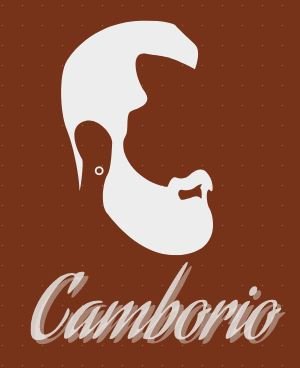En Nuevo Mundo/In the New World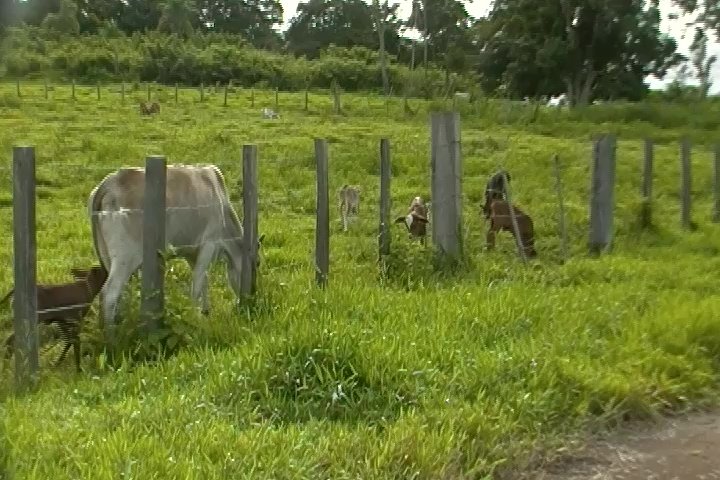

Just as I was about to start the story, the teacher arrived and took the little ones away because they had a visit to the dispensary, so the sixth graders and some young high school students, relatives of the latter, stayed with me. Now we are ready because I am going to start.
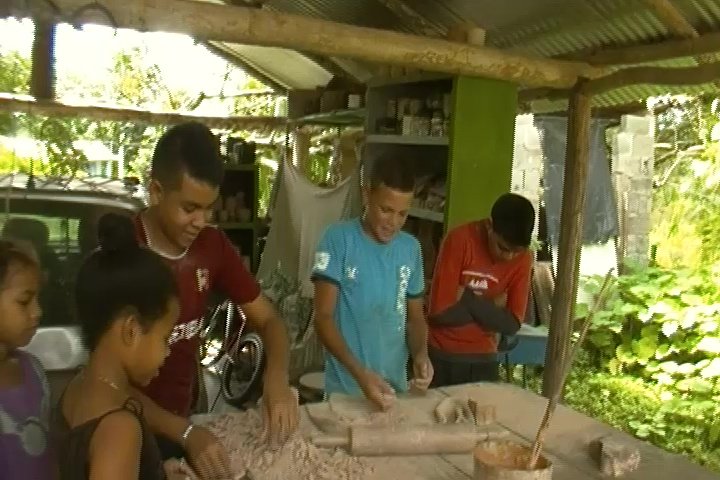
La historia sucedió en Mundo Nuevo, y como todos ustedes saben, Mundo Nuevo es un pueblito a la entrada de Upata, viniendo de San Félix; tiene como antesala al caserío de Altagracia, uno de los poblados más antiguos de estas regiones, asiento de las misiones que fundaron en el siglo XVII los sacerdotes capuchinos, cuando llegaron a maniatar y esclavizar a los habitantes primigenios de las tierras guayanesas.
Mundo Nuevo tiene varias rallanderías. Ahora pregunto:¿Que es una Rallandería? ¡Cualquiera sabe, profe. Donde se hace casabe! Exclamó rápidamente una de las niñas, exactamente María José, en ese lugar se realiza una actividad artesanal; allí se raya la yuca amarga y se elabora el Casabe.
The story happened in Mundo Nuevo, and as you all know, Mundo Nuevo is a small town at the entrance of Upata, coming from San Felix; it has as a prelude the hamlet of Altagracia, one of the oldest towns of these regions, seat of the missions that were founded in the 17th century by the Capuchin priests, when they came to tie up and enslave the original inhabitants of the Guiana lands.Mundo Nuevo has several grating shops. Now I ask: What is a "rallandería"? Where cassava is made! Quickly exclaimed one of the girls, exactly Maria Jose, in that place a handmade activity is made; there the bitter yucca is scratched and the Casabe.
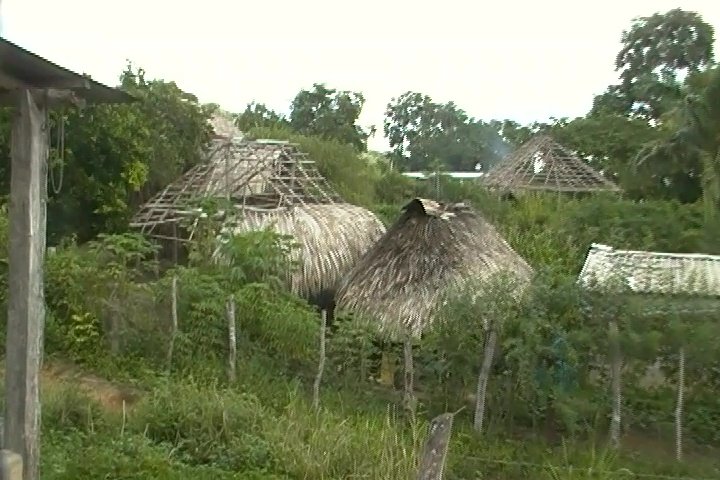 Rallanderias
Rallanderias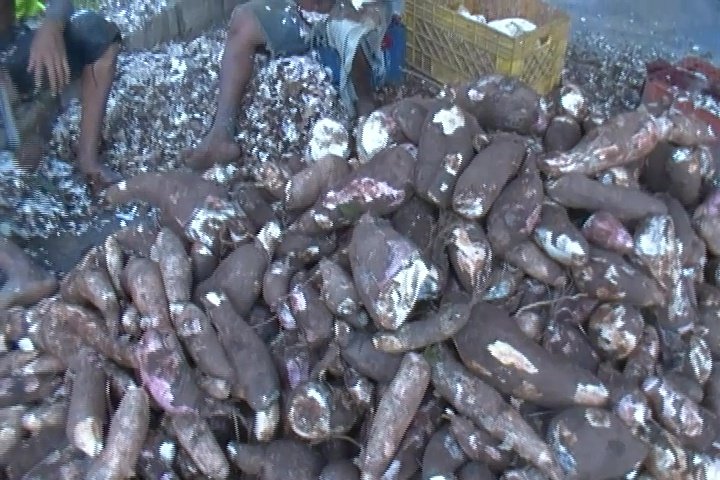 Yuca
Yuca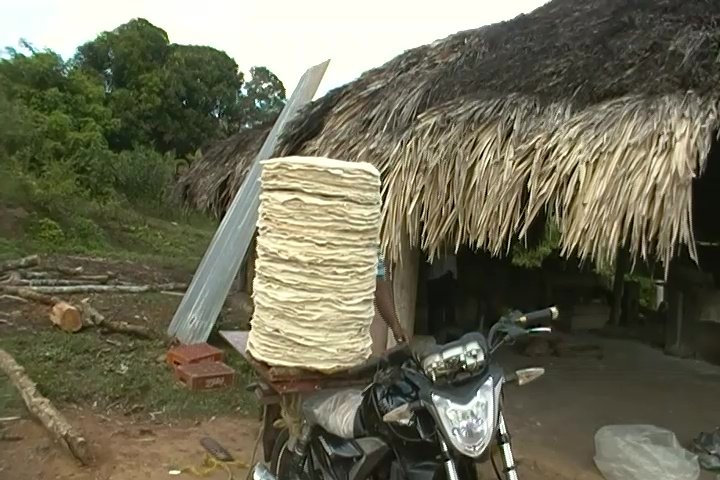 Casabe
CasabePero sigamos con la historia, también el pueblo tiene una escuela y una cancha deportiva bastante grande, aunque un poco descuidada. Mi primer día en la escuela para iniciar el taller de teatro fue bastante colorido; quiero decir hubo alegría y entusiasmo de parte de los escolares. Por algún tiempo mi ida a la escuelita desde Upata fue rutinaria, llegaba y compartía con los niños las maneras de construir muñecos con desechos.
Profe. Pero donde está la parte que da miedo,interrumpió otra de las niñas. Calma que pronto llegaremos a ese punto,¿Puedo continuar? !Si! Si! Gritaron al unísono los estudiantes.
Entonces prosigo. Resulta que llevaba ya tres semanas con el taller-era los lunes y los viernes- cuando una mañana que me encontraba disfrutando del desayuno obsequiado por las mujeres que cocinan en la escuela, se me acerco una de ella y me dijo mientras me daba otra taza de café con un bollito pelón; “profe ayer se cumplieron sesenta años de los ahorcados”. Viendo mi sorpresa y que casi me atraganto después de decirme eso; se explicó, “verá profe, en este pueblo hace unos sesenta años pasó algo que aún la gente recuerda y hasta los más jóvenes lo saben por que los viejos se lo contamos”. Una vez que logré pasar el bollo con el café, pude responderle; “bien ahora con calma Isabel, cuéntame cómo es la historia”.
-En este momento la audiencia que había estado inquieta y distraída, hizo silencio, se justaron unos con otros, abriendo los ojos como si quisieran oír con ellos-.
La señora con tranquilidad me señaló una silla, y arrimando otra se sentó, comenzando el relato... "resulta profe, que por el año de 1954, mas o menos, llegó a Mundo Nuevo un hombre, venía de Los Arrendajos según se regó por el caserío; era joven, guapo, y amable con las mujeres; en fin era la envidia de los hombres de este terruño y el sueño de nosotras; aunque yo era una niñita de seis años en ese tiempo. Era mujeriego como ninguno, se comentaba que en los caseríos del Yagual, Buen Retiro, San Ramón y hasta en Upata; había dejado corazones rotos y padres que lo buscaban para cóbraselas. Se llamaba Juan Rodrigo. Compró una finquita aquí, cerca del campo de los Mendoza y allí comenzó con fundamento la siembra de cacao, café, tabaco; pasto y metió un ganado de engorde. Con el tiempo Juan Rodrigo estaba considerado uno de los hacendados mas prósperos de Mundo Nuevo. Sería como en el año 58 que le dio por jugar gallos. No tuvo gallos propios pero le gustaba ir y apostar en las galleras; Y fíjese Don, el muy ladino tenia mucha suerte, gallo que le ponía el ojo, gallo que ganaba la pelea. Entonces comenzaron a rodearlo los jala bolas de siempre, Rodrigo esto, Rodrigo aquello. Muchos galleros lo invitaban para que viera y midiera las condiciones de sus animales; él iba, comía, tomaba y casi siempre decía ”es que tengo que verlos en la gallera, allí es donde los gallos me tramiten sus condiciones”. Pero esa afición por los gallos perjudicó su hacienda, estaba descuidada y los cultivos iban a menos”.
But let's continue with the story, also the town has a school and a fairly large sports field, although a little neglected. My first day at school to start the theater workshop was quite colorful; I mean there was joy and enthusiasm on the part of the schoolchildren. For some time my trip to the Colegio from Upata was routine, I would arrive and share with the children the ways of building dolls out of garbage.Teacher. But where is the scary part, another of the girls interrupted Calm down, we will soon get to that point, can I continue? Yes! Yes! the students shouted in unison.
Then I continue. As it turns out, I had been attending the workshop for three weeks now - it was on Mondays and Fridays - when one morning, while I was enjoying breakfast given to me by the women who cook at the school, one of them came up to me and said, while giving me another cup of coffee with a bald bun, "Teacher, yesterday was the 60th anniversary of the hanging. Seeing my surprise and that I almost choked after telling me that; she explained to herself, "see teacher, in this town some sixty years ago something happened that even people remember and even the youngest know it because we old people told them about it". Once I managed to pass the bun with the coffee, I was able to answer her; "well now calmly Isabel, tell me how the story is".
-At this moment the audience, who had been restless and distracted, became silent, and they were fair with each other, opening their eyes as if they wanted to hear with them.
The lady calmly pointed out a chair to me, and moved to another one and sat down, beginning the story... "It turns out that around the year 1954, more or less, a man arrived in Mundo Nuevo, he came from Los Arrendajos as he was watered by the farmhouse; he was young, handsome, and kind to women; in short, he was the envy of the men of this land and the dream of us; although I was a little girl of six years old at the time. He was a womanizer like no other, it was said that in the hamlets of Yagual, Buen Retiro, San Ramon and even in Upata; he had left behind broken hearts and parents who were looking for him to mate them. His name was Juan Rodrigo. He bought a little farm here, near the Mendoza's field, and there he started with good reason the sowing of cocoa, coffee, tobacco and grass, and introduced a fattening cattle. Eventually, Juan Rodrigo was considered one of the most prosperous landowners of the New World. It would be like in the year 58 when he started playing roosters. He didn't have his roosters, but he liked to go and bet on the chickens. And look at Don, the very sly one was very lucky, a rooster that had his eye on him, a rooster that won the fight. So they started to surround him with the usual ball-pulling, Rodrigo this, Rodrigo that. Many cockfighters invited him to see and measure the conditions of their animals; he would go, eat, drink and almost always say "I have to see them in the chicken coop, that's where the roosters would tell me their conditions". But that fondness by the roosters harmed its property, was neglected and the cultures went to less".
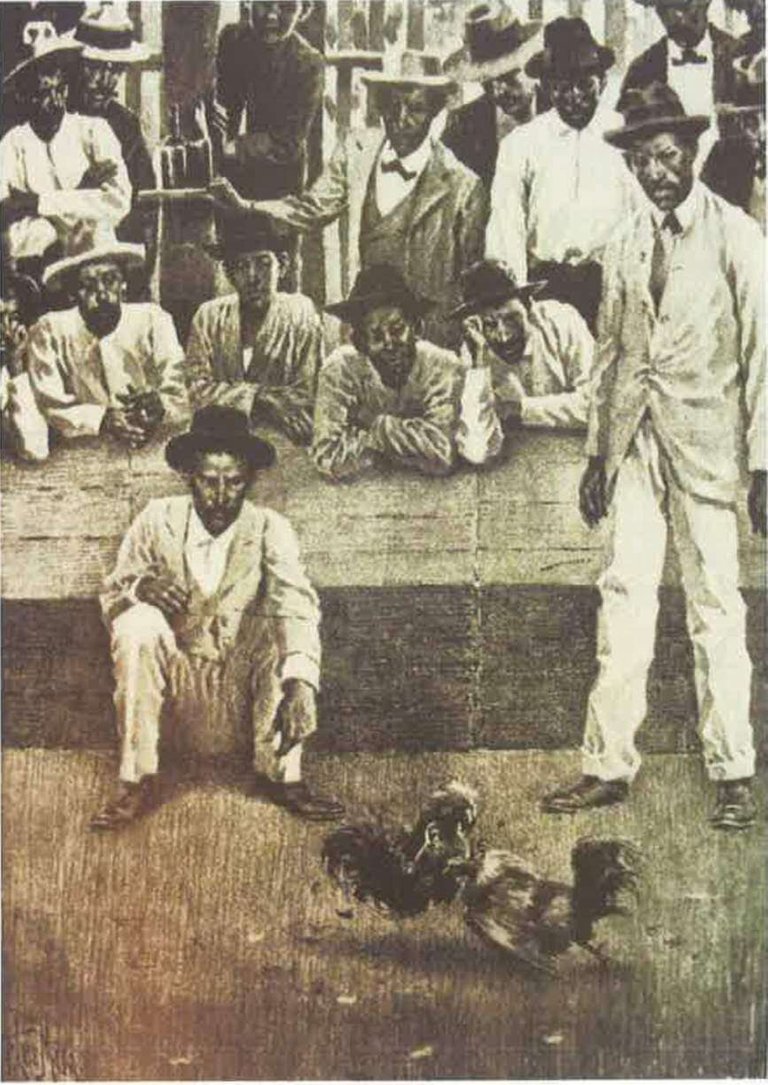
En ese momento uno de los niños se levantó y me dijo “ profe. ¡Yo soy de apellido Rodrigo! Despreocúpate Carlitos, pueda que sea familiar tuyo, pero muy lejano. Ahora dejen que siga la historia.
La señora de la cocina siguió con su historia; “Un día o mejor dicho una tarde como a las cuatro, en la gallera de Mundo Nuevo se diputaban unos trofeos para las mejores peleas; vinieron galleros de toda partes, de Los Arrendajos, San Ramón, Buen Retiro; Upata, El Palmar e inclusive de San Félix. Bueno mi profe, allí estaba él, rodeado de sus séquito de jala mecates y su sonrisa contagiosa preparándose para ver las peleas.Ese día había llegado Don Isnaldo, hijo de Don Manuel Arcaya,fundador de Mundo Nuevo; el señor Isnaldo poseía dos hatos con más de mil vacas y cien toros, a parte de ovejas y chivos; un trapiche, la única fabrica de tabacos, y tostaba y molía café para llevar a San Félix.
At that moment one of the children stood up and said to me "teacher, my last name is Rodrigo! Don't worry Carlitos, he may be a relative of yours, but very far away. Now let the story continue.
The lady in the kitchen continued with her story; "One day or better said one afternoon at about four o'clock, in the New World's chicken coop trophies were handed out for the best fights; chicken coops came from all over, from Los Arrendajos, San Ramon, Buen Retiro; Upata, El Palmar and even from San Felix. That day, Don Isnaldo, son of Don Manuel Arcaya, founder of Mundo Nuevo, had arrived; Mr. Isnaldo had two herds of cattle with more than a thousand cows and a hundred bulls, besides sheep and goats; a tobacco mill, the only one that made tobacco, and he roasted and ground coffee to take to San Felix.
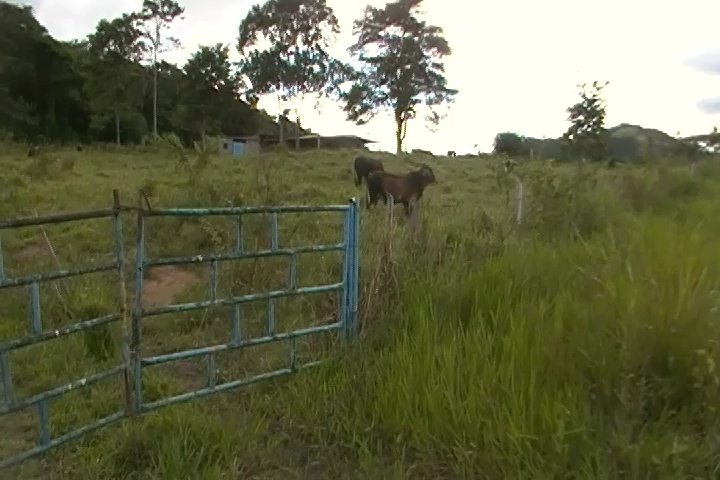 Hato
HatoEra un hombre ya avejentado pero fuerte; con el llegó su mujer una hermosa trigueña de esas que se dan por estas tierras. Bonita, exuberante, alta y de muy buenas formas. Al ojo de Juan Rodrigo no le fue indiferente semejante mujer, pero estaba concentrado en los gallos que iban a comenzar la pelea.
La jornada inicio y la primera pelea fue despachada rápidamente, luego vino otra, la cual levantó algarabías en los presentes. La tercera riña era la mas importante; Don Isnaldo llevaba su gallo pinto, y otro gallero del palmar el suyo nada despreciable. Las apuestas se dejaron escuchar,unos iban al gallo pinto otros al forastero que era Giro. Al poco rato de estar los dos animales en el ruedo, se inclinaron al gallo de Don Isnaldo. Algunos de los presentes no se atrevían a dar sus apuestas, esperaban el dictamen de Juan Rodrigo; este observando con detenimiento dijo, ¡Esperemos que comience y a apostaré al ganador!
La pela comenzó, inició con violencia y encontronazos, dos o tres veces los animales se confrontaron espuela contra espuela; se retiraban una y otra vez para ver mejor su contrincante, pero ya el gallo del Palmar estaba como cojeando; alguien grito, ¡ya se le calló el ala, esta bichaó!, ¡Treinta pesos al gallo Pinto!. Fue allí cuando Juan Rodrigo dijo fuerte pero sin gritar ¡Cien pesos a que el Giro gana la pelea! Hubo un silencio extraño, los seguidores de Juan se asombraron; ¿es que no veía bien, estaba borracho?; el gallo de Don Isnaldo se notaba inmenso en la gallera. Pero Juan dobló la apuesta: ¡Doscientos a que el Giro gana!. Pero no fue Don Isnaldo quien reposto la apuesta, fue su mujer. ¡Bien joven, si quiere perder sus dinero, aquí va, apostado, y no diga que no se le avisó!
Los animales como sabiendo de que se trataba, se dieron con mas furia; hasta que lo obvio sucedió el gallo de Don Isnaldo mató al medio Giro. El hacendado se acerco a Juan Rodrigo y le dijo condescendencia ”ya ve amigo Rodrigo, algunas veces también se pierde, pero no se preocupe, habrá nuevas oportunidades”; “cierto Don Isnaldo, pero perdiendo también se gana”; respondió Juan expreso con cierta malicia.
Desde ese día la afición de los gallos fue creciendo; pero no eran los gallos profe. Era la mujer del Don, quien iba a las galleras a verse con él.
Al poco tiempo,todos en Mundo Nuevo cuchicheaban los amores de Juan y Carmen, mas de un amigo se le acerco a Juan, diciéndole ”mire amigo deje a esa mujer, don Isnaldo es hombre de cuidado, de mucho cuidado.Las mujeres estaban consternadas su galán estaba locamente enamorado de la trigueña Carmen, y veían su perdición.
Isabel, una de las tantas que suspiraba por Juan, dijo soltando una risotada¡Pero ya saben, cuando un hombre se enamora nadie la detiene!
Don Isnaldo se enteró, pero el muy ladino se quedó callado; no hizo nada, no dijo nada, siguió yendo a las galleras. El comentario taladraba sus oídos, pero él inmutable. El hombre estaba preparando algo mi profe. ya verá. Resulta que llegaron las vísperas de las fiestas patronales de Mudo Nuevo en honor. Don Isnaldo se hizo nombrar padrino de las fiestas; ofreció terneras, y le compró un traje a la reina de las fiestas, de igual manera, invitó a al alcalde, al jefe de la policía y algunos amigotes diputados.
Fueron tres días de parrandas,toros coleados, gallos y juegos tradicionales. El último día era el baile oficial, el alcalde bailó con la mujer del Don,y Juan Rodrigo estaba allí con su sonrisa esperando su turno para bailar.Todos en el pueblo veían de reojo la osadía de Juan cuando tomó a Carmen y la llevó al centro de la pista de baile.Por un buen rato los presentes suspendieron la respiración,algo pesado y angustioso pasaban en sus corazones.La pareja siguió bailando,hasta que Juan se retiró.
Un suspiro de alivio se escucho en el ambiente cuando el atrevido galán se fue de la fiesta.
Luego vinieron las palabras de don Isnaldo como padrino y después presento al alcalde para que le hablara al pueblo.
Justo cuando el ciudadano alcalde tomaba el micrófono se escuchó un grito espeluznante, y otro seguidamente. Alguien grito; "¡viene de la Ceiba!” La policía, junto algunos vecinos corrieron hacia la Ceiba; no tuvieron que buscar mucho, allí estaban profe. Juan y Carmen y colgando en la rama más alta de la mata; con las tripas afuera y los zamuros picoteándolos”.
Cuando calló la cocinera, tragué el último trozo de bollo, acompañado por la gota de café que quedaba en la taza; ambos recorrieron mi garganta amargos y fríos, como los cuerpos de Juan y Carmen colgados en la Ceiba de Mundo nuevo.
He was an old but strong man; with him his wife arrived a beautiful brunette of those that occur in these lands. Beautiful, exuberant, tall and with very good forms. The eye of Juan Rodrigo was not indifferent to such a woman, but he was concentrated on the cocks that were going to start the fight.
The day began and the first fight was quickly dispatched, then came another, which raised a lot of noise in those present. The third fight was the most important one; Don Isnaldo was carrying his rooster, and another one of his roosters was not despicable. The bets were heard, some went to the Gallo pinto and others to the stranger who was Giro. Soon after the two animals were in the ring, they bowed to Don Isnaldo's rooster. Some of those present did not dare to place their bets, they waited for Juan Rodrigo's opinion; he looked at them carefully and said, "Let's hope it starts and I'll bet on the winner!The fight began, it started with violence and clashes, two or three times the animals confronted each other spur by spur; they withdrew, again and again, to see their opponent better, but the cock of the Palmar was already limping; someone shouted, his wing fell off, this bichao, thirty pesos to the cock Pinto! It was then that Juan Rodrigo said loudly but without shouting "One hundred pesos to the Giro wins the fight! There was a strange silence, Juan's followers were astonished; could it be that he could not see well, that he was drunk; Don Isnaldo's cock was immense in the cockerel. But Juan doubled the bet: Two hundred says the Giro wins! But it wasn't Don Isnaldo who refueled the bet, it was his wife. Well, young man, if you want to lose your money, here you go, betting, and don't say you weren't warned!
The animals, as if they knew what it was all about, were more furious; until the obvious happened, Don Isnaldo's rooster killed the half Giro. The landowner approached Juan Rodrigo and told him condescension "you see Rodrigo, sometimes you lose too, but don't worry, there will be new opportunities"; "true Don Isnaldo, but losing also wins"; answered Juan with certain malice.
From that day on the fondness for roosters grew; but it was not the professors' roosters. It was Don's wife, who went to the chickens to meet him.
Soon after, everyone in Mundo Nuevo whispered about Juan and Carmen's love, but a friend approached Juan, saying "look, friend, leave that woman, Don Isnaldo is a careful man, a very careful man.
Isabel, one of the many who sighed for Juan, said with a laugh: "But you know when a man falls in love, nobody stops him!
Don Isnaldo found out, but the very sly one remained silent; he did nothing, said nothing, and continued to go to the chickens. The comment pierced his ears, but he was immutable. The man was preparing something, my teacher, you will see. As it turns out, the eve of the Mudo Nuevo patron saint festival arrived in honor. Don Isnaldo had himself named godfather of the festivities; he offered calves and bought a costume for the queen of the festivities. He also invited the mayor, the chief of police, and some friendly deputies.
It was three days of parrandas, bulls, roosters and traditional games. The last day was the official dance, the mayor danced with Don's wife, and Juan Rodrigo was there with a smile on his face waiting for his turn to dance. Everyone in town watched out for Juan's audacity when he took Carmen to the center of the dance floor.
A sigh of relief was heard in the air as the daring young man left the party.
Then came the words of Don Isnaldo as a godfather and then he introduced the mayor to speak to the people.
Just as the citizen mayor took the microphone, a chilling scream was heard, and another one followed. Someone shouted; "it comes from La Ceiba!" The police, together with some neighbors, ran to La Ceiba; they did not have to look for much, there they were prof. Juan and Carmen were there, hanging from the highest branch of the bush, with their guts out and the vultures pecking at them.
When the cook fell, I swallowed the last piece of the bun, accompanied by the drop of coffee that was left in the cup; both of them ran down my throat bitter and cold, like the bodies of Juan and Carmen hanging in the Ceiba of Mundo Nuevo.
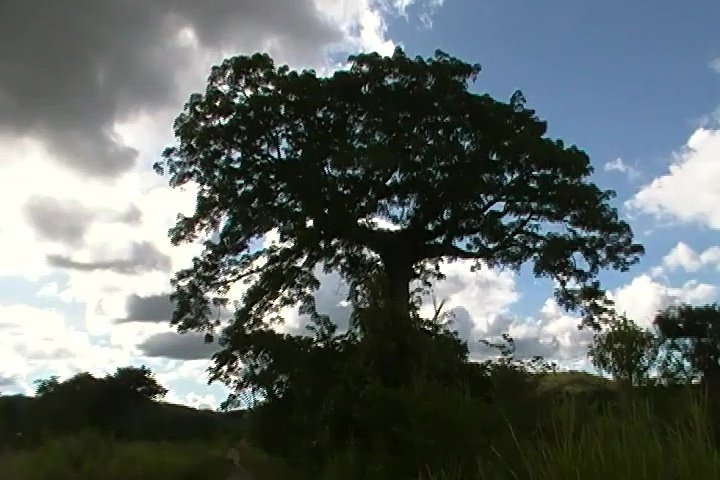 Ceiba
Ceiba Cuando terminé el relato, vi que los niños y las niñas de sexto y los adolescentes estudiantes de bachillerato habían hecho un grupo compacto, casi que se pegaban unos contra otros, nadie se movió por un rato, hasta que una jovencita de trece a catorce años dijo con alivio; “cójale profe. Lo que soy yo, más nunca vuelvo a pasar por debajo de esa ceiba ¡Mas nunca!" Aproveché la ocasión para despedirme de los participantes del taller, convocándoles para la próxima clase.
Ya preparado para irme, otra de las niñas preguntó a gritos ¿Y nos contará otro cuento profe?, Como sabiendo la respuesta hice la respectiva consulta ¿pero esta vez que tipo de cuento quieren? Gritaron a una sola voz ¡De miedo profe!¡De miedo!... Entonces la próxima vez, así sera...
When I finished the story, I saw that the sixth graders and the teenage high school students had made a compact group, almost hitting each other, nobody moved for a while, until a young girl of thirteen to fourteen said with relief; "catch him, teacher. What I am, I'll never go under that ceiba tree again, never again! I took the opportunity to say goodbye to the workshop participants, calling them for the next class.
Already prepared to leave, another of the girls shouted out, "Will you tell us another teacher's story? As I knew the answer, I made the respective consultation, but this time what kind of story do you want? They shouted with one voice, "Teacher, teacher, teacher! So next time, that's how it will be...
Continuaremos con la serie "Por la ruta del Yare" en la próxima entrega. Agrego los links para que visiten las publicaciones anteriores:
We will continue with the series "By the route of the Yare" in the next delivery. I add the links to visit the previous publications:
https://peakd.com/travel/@camborio/por-la-ruta-del-yare
https://peakd.com/gems/@camborio/por-la-ruta-del-yare-qlfvb2
